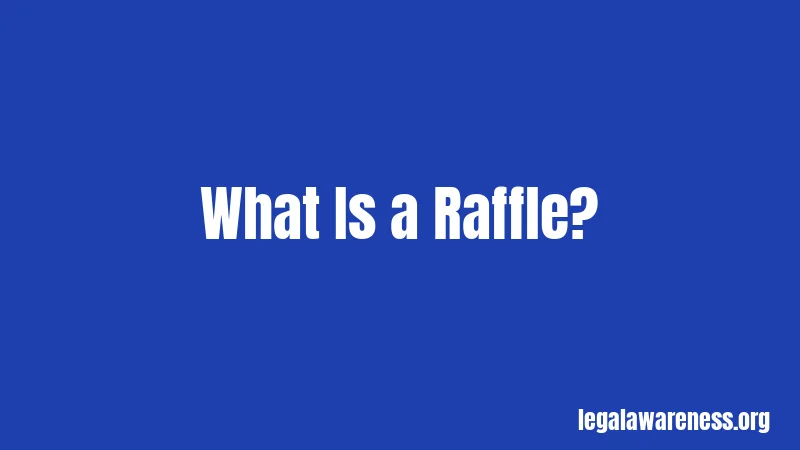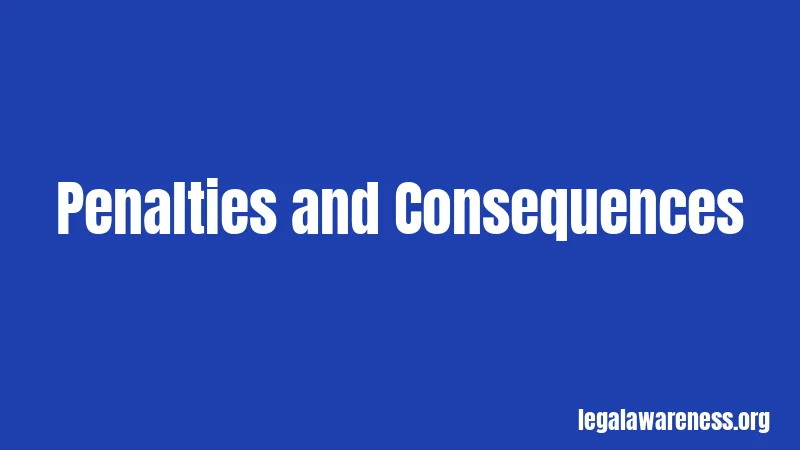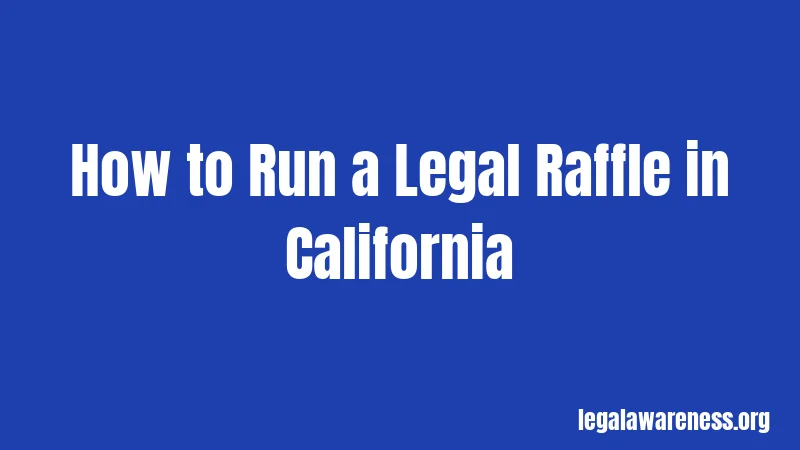California Raffle Laws (2026): The Legal Lowdown
Most people think raffles are totally fine as long as they’re for charity. Here’s the thing: California has some strict rules about raffles that catch a lot of folks off guard. Whether you’re planning a fundraiser, a company event, or just want to run a simple raffle, you need to know what’s legal and what’ll get you in serious trouble.
The penalties can hit hard. You could face criminal charges, hefty fines, or even jail time if you get it wrong. Let’s break down exactly what you need to know so you can stay on the right side of California law.
What Is a Raffle?

Pretty straightforward to define. A raffle is when you sell tickets to people and randomly select winners to get prizes. The key part is the random selection. You’re asking people to pay money for a chance to win something, and luck determines who gets the reward.
California law takes raffles seriously because they can turn into gambling pretty fast. The state wants to make sure raffles aren’t being used as a way for businesses to run illegal lotteries or take advantage of people.
Basic California Raffle Laws
When Raffles Are Actually Illegal
Here’s where things get important. In California, most raffles are flat-out illegal. Yep, that’s right. You read that correctly. The general rule is: raffles are prohibited unless you fit into one of the specific exceptions the law allows.
Think of it like this: raffles are guilty until proven innocent in California. You need special permission to run one legally. If you don’t have that permission, you could face criminal charges. So before you even think about selling one ticket, ask yourself: do I fit into an exception?
The Exceptions: When Raffles Are Legal
California does allow raffles in specific situations. Not every raffle is illegal, but you have to meet the right conditions. Here’s what makes a raffle legal in California:
Nonprofit organizations with a charitable purpose. This is the big one. If you’re a registered nonprofit, you can run raffles. But not every nonprofit qualifies. The nonprofit has to be organized and operated for charitable purposes. We’re talking about groups helping people in poverty, the elderly, people with disabilities, or other recognized charitable causes.
Churches and religious organizations. These get special consideration in California. If you’re running a raffle for a legitimate religious purpose, you can do it legally.
Certain veterans, youth, and school organizations. Some specific groups like veterans organizations, youth groups, and parent-teacher organizations can run raffles under certain conditions.
Casino gaming at charitable events. This is different from a traditional raffle, but it’s worth mentioning. Some nonprofits can run limited gaming events.
Still confused about whether you qualify? Let me break it down. You need to check three things: Is your organization registered as a nonprofit? Does it have a legitimate charitable purpose? Have you registered the raffle with the local authorities?
Getting Permission: The Registration Process
Okay, so you think you might qualify. What’s next? You can’t just start selling raffle tickets and hope nobody notices.
Different counties and cities in California have different rules for raffle registration. Usually, you need to register your raffle with the county clerk’s office or local authorities before you start. Some cities also require approval from the police department or a gambling control board.
Here’s the basic process: You contact your local county or city clerk. You fill out a raffle registration form. You provide information about your organization, the purpose of the raffle, the prize details, and where the money goes. You pay the registration fee. Then you wait for approval.
Honestly, this is the part most people miss. They assume they can just run a raffle because they’re a nonprofit. Not true. You have to actually register it first. Skipping this step could cost you big time.
Penalties and Consequences

Let’s talk about what happens if you break California raffle laws. The consequences are serious, and they’re not something you want to mess with.
Running an illegal raffle is a criminal offense in California. You could face misdemeanor charges, felony charges, or both depending on how big the raffle was and how much money was involved. Think of it like getting a ticket for speeding, but way more serious.
Fines
The financial penalties are hefty. For illegal raffle operations, you could face fines ranging from hundreds to thousands of dollars. If it’s a larger operation, fines can go into the tens of thousands. These aren’t small penalties. They can seriously impact your personal finances or your organization’s budget.
Jail Time
Yes, jail time is possible. If you’re convicted of illegally operating a raffle, you could face county jail time, typically ranging from a few months up to a year or more depending on the situation. A felony conviction could mean state prison time, though that’s usually for larger-scale operations.
Other Consequences
Beyond fines and jail time, you could lose your nonprofit status. If you’re a charity running illegal raffles, the state can revoke your nonprofit registration. That’s devastating for any organization. You also might face civil liability if someone sues you. Plus, there’s the reputation damage. Once word gets out that your organization ran an illegal raffle, donors and supporters might disappear.
Special Circumstances and Important Details
Small Raffles and Bingo
California has some specific rules about smaller raffles. Some cities and counties allow what are called “small raffles” with lower prize amounts and fewer ticket sales. The rules vary by location, so you have to check locally.
Bingo is actually treated differently than traditional raffles. Bingo games for charitable purposes are generally legal under different state regulations. If you’re thinking about running a bingo game instead of a raffle, check with your local authorities because the rules are separate.
Merchandise Prize vs. Cash Prize
Here’s something important: the type of prize matters. Some jurisdictions are stricter about cash prizes than merchandise prizes. Honestly, this is the kind of detail that can trip you up. Before you decide what prize to offer, check with your local county clerk about specific rules in your area.
Tickets and Record-Keeping
If you do get permission to run a raffle, you have to keep detailed records. You need to track every ticket sold, how much money came in, what prizes were given out, and how the proceeds were used. California law requires this documentation.
How to Run a Legal Raffle in California

Alright, let’s say you’re a legitimate nonprofit and you want to do this the right way. Here’s what you actually need to do.
Step 1: Check your organization’s status. Make sure your nonprofit is registered with the state of California and has a legitimate charitable purpose documented.
Step 2: Check local rules. Call your county clerk’s office. Ask them about raffle regulations in your area. Some counties are stricter than others. Some might have restrictions on prize amounts or ticket sales.
Step 3: Get the raffle registration form. Your county clerk will provide the application. Fill it out completely. Don’t leave anything blank or vague.
Step 4: Gather required documentation. Most applications require proof of nonprofit status, a detailed description of the raffle, information about the prizes, and details about how the money will be used.
Step 5: Submit and pay the fee. File your application with the appropriate fee. Fees usually range from $25 to $100 depending on your county.
Step 6: Wait for approval. This can take a few days to a few weeks. Don’t start selling tickets until you get written approval.
Step 7: Follow all rules exactly. Once approved, follow every regulation. Keep records. Use approved ticket formats. Hold the drawing as described in your application.
Step 8: Report the results. After the raffle ends, you may need to file a report showing how many tickets were sold, what prizes were given, and where the money went.
Trust me, following these steps takes time, but it keeps you out of trouble. And trust me, trouble is something you don’t want.
Frequently Asked Questions
Can I run a raffle through social media or online?
This gets complicated fast. California law on online raffles is still evolving, and the rules are strict. Generally, online raffles have even more restrictions than in-person raffles. Before you even think about running an online raffle, consult with a lawyer familiar with California gambling law. It’s worth the cost.
What if I run a small raffle with just friends and family?
Here’s what catches people: even small, informal raffles can be illegal. If money changes hands and someone wins based on a random drawing, it technically might violate California law, even if nobody profits from it. The safest approach is to get official permission even for small events.
Can my church run a raffle without registering?
Some religious organizations have exemptions, but “some” doesn’t mean “all.” Many churches still need to register. Check with your county clerk or talk to your diocese about specific requirements for your church.
What’s the difference between a raffle and a sweepstakes?
Good question. A raffle usually requires people to buy tickets. A sweepstakes often doesn’t require a purchase. This distinction matters legally. Sweepstakes have different rules, and sometimes they’re easier to run legally. Talk to a lawyer about which one fits your situation.
Can a business run a raffle to raise money?
For-profit businesses basically can’t run raffles in California. That’s reserved for nonprofits and specific organizations. If your business wants to do a promotional drawing, it might need to be structured as a sweepstakes instead, which has different rules.
What happens if I mess up the registration process?
If your application was denied or incomplete, don’t just start the raffle anyway. That’s asking for legal trouble. Either fix the application and resubmit, or don’t run the raffle. It’s that simple.
Final Thoughts
California’s raffle laws exist for a reason. They protect people from illegal gambling operations hidden under the guise of fundraisers. But if you follow the rules, registering and running a legal raffle is totally doable.
The key is doing your homework first. Talk to your county clerk. Check the specific rules in your area. Fill out the paperwork correctly. Get written approval before you sell a single ticket. Keep detailed records. Report your results honestly.
Yes, it requires more effort than just hoping nobody notices. But it keeps your organization safe, protects your donors’ trust, and keeps you out of legal trouble. And honestly, that’s worth the extra work.
When in doubt, ask for help. Your county clerk can answer basic questions for free. If you’re unsure about anything, a lawyer who specializes in nonprofit law or gambling law in California can give you peace of mind. The consultation costs less than the fines if you get it wrong.
Stay informed, follow the rules, and you can run a successful, legal raffle that actually helps your organization.
References
California Penal Code, Section 320-330 – Gambling laws and raffle regulations https://leginfo.legislature.ca.gov/faces/codes_displayexpandedtopic.xhtml?lawCode=PC&division=&title=&part=&chapter=4&article=
California Penal Code, Section 320.5 – Charitable raffle exemptions and requirements https://leginfo.legislature.ca.gov/faces/codes_displaytext.xhtml?lawCode=PC&division=&title=&part=&chapter=4&article=§ion=320.5
California Department of Justice – Gambling Control Commission https://www.doj.ca.gov/gambling-control
Nonprofit Law Section – CalNonprofits https://www.calnonprofits.org/
County Clerk Association of California – Local Raffle Registration Resources https://www.ccaco.org/
